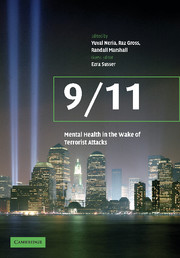Book contents
- Frontmatter
- Contents
- Acknowledgments
- Editors brief bio
- List of contributors
- Foreword
- Part I Introduction
- Part II The psychological aftermath of 9/11
- Part III Reducing the burden: community response and community recovery
- Part IV Outreach and intervention in the wake of terrorist attacks
- Part IV A New York area
- 16 PTSD in urban primary care patients following 9/11
- 17 Project Liberty: responding to mental health needs after the World Trade Center terrorist attacks
- 18 Mental health services support in response to September 11: the central role of the Mental Health Association of New York City
- 19 The New York Consortium for Effective Trauma Treatment
- 20 Evaluation and treatment of firefighters and utility workers following the World Trade Center attacks
- 21 The World Trade Center Worker/Volunteer Mental Health Screening Program
- 22 Child and adolescent trauma treatments and services after September 11: implementing evidence-based practices into complex child services systems
- 23 Relationally and developmentally focused interventions with young children and their caregivers in the wake of terrorism and other violent experiences
- Part IV B Washington, DC
- Part IV C Prolonged-exposure treatment as a core resource for clinicians in the community: dissemination of trauma knowledge post-disaster
- Part V Disasters and mental health: perspectives on response and preparedness
- Index
17 - Project Liberty: responding to mental health needs after the World Trade Center terrorist attacks
from Part IV A - New York area
Published online by Cambridge University Press: 27 October 2009
- Frontmatter
- Contents
- Acknowledgments
- Editors brief bio
- List of contributors
- Foreword
- Part I Introduction
- Part II The psychological aftermath of 9/11
- Part III Reducing the burden: community response and community recovery
- Part IV Outreach and intervention in the wake of terrorist attacks
- Part IV A New York area
- 16 PTSD in urban primary care patients following 9/11
- 17 Project Liberty: responding to mental health needs after the World Trade Center terrorist attacks
- 18 Mental health services support in response to September 11: the central role of the Mental Health Association of New York City
- 19 The New York Consortium for Effective Trauma Treatment
- 20 Evaluation and treatment of firefighters and utility workers following the World Trade Center attacks
- 21 The World Trade Center Worker/Volunteer Mental Health Screening Program
- 22 Child and adolescent trauma treatments and services after September 11: implementing evidence-based practices into complex child services systems
- 23 Relationally and developmentally focused interventions with young children and their caregivers in the wake of terrorism and other violent experiences
- Part IV B Washington, DC
- Part IV C Prolonged-exposure treatment as a core resource for clinicians in the community: dissemination of trauma knowledge post-disaster
- Part V Disasters and mental health: perspectives on response and preparedness
- Index
Summary
Introduction
The impact of the World Trade Center terrorist attacks has no historical peacetime precedent in the USA in terms of loss of human life, magnitude of physical destruction, adverse economic consequences, and psychological distress and disorder. In this chapter, we review the literature on mental health consequences of disaster, review research findings on the mental health consequences of the 9/11 attacks, describe the large-scale response undertaken by the New York State Office of Mental Health (NYSOMH) to address the mental health needs, and, finally, summarize lessons learned and their public health implications for mental health and homeland security policy.
Historical perspective: long-term mental health impact
Disaster experts have consistently documented the persistence of mental health needs long after the disastrous event itself. The 1995 bombing of the Alfred P. Murrah building in Oklahoma City was perhaps the best-documented mass violence disaster in terms of its impact on mental disorders before the attacks of September 11, 2001. Surveys conducted in the Oklahoma City metropolitan area found that 62% of persons reported experiencing at least one of the following as a direct response to the bombing: increased alcohol use (approximately double their prior amount), increased psychological distress (approximately double their prior level), post-traumatic stress disorder (PTSD) symptoms, and intrusive thoughts related to the bombing (Smith et al., 1999). The psychological effects were prominent and persisted more than a year after the disaster. Two years after the disaster, children who were geographically distant from the disaster site and did not directly experience an interpersonal loss still reported PTSD symptoms and functional impairment associated with increased media exposure and indirect loss (Pfefferbaum et al., 2000).
- Type
- Chapter
- Information
- 9/11: Mental Health in the Wake of Terrorist Attacks , pp. 264 - 281Publisher: Cambridge University PressPrint publication year: 2006
- 2
- Cited by

